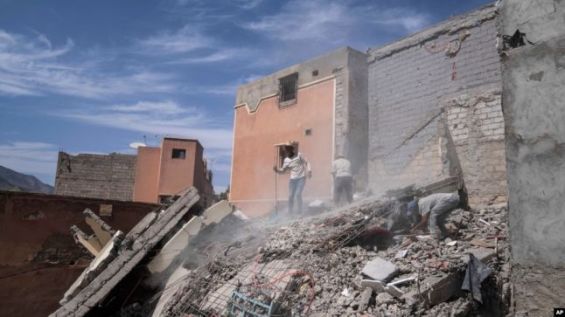In Rabat on Thursday, the Ministry of the Economy and Finance and the European Investment Bank (EIB) signed an agreement to finance the integrated post-earthquake reconstruction and upgrading program for Al Haouz, for a total amount of 500 million euros (M€).
The agreement was signed by Fouzi Lekjaa, Minister Delegate to the Minister of the Economy and Finance, in charge of the Budget, and EIB Vice-President Ioannis Tsakiris, in the presence of Khalid Ait Taleb, Minister of Health and Social Protection, and Chakib Benmoussa, Minister of National Education.
This financing agreement represents the first installment of an overall financing package worth one billion euros, intended to support reconstruction and upgrading efforts in the regions affected by the Al Haouz earthquake.
Speaking on the occasion, Lekjaa stressed that this financial partnership is part of efforts to mobilize the resources needed to rehabilitate essential infrastructure and basic services in the earthquake-affected regions. He added that the program will be implemented in two phases over a five-year period.
The first phase will focus on rebuilding basic infrastructure and rebuilding and rehabilitating main roads, while the second phase will be devoted to supporting the Moroccan government in its overall upgrading efforts, with a view to establishing an integrated and balanced territorial and socio-economic development model for the region.
For his part, Tsakiris, who is on an official visit to Morocco as part of the EIB's strengthening of its partnership with the Kingdom, said that this financing «will not only help to restore vital services in the hardest-hit regions, but also to rebuild modern, resilient, and environmentally-friendly infrastructure».
«Our aim is to enable the inhabitants of the disaster-stricken regions to regain decent living conditions, with modern schools, roads, and hospitals meeting the highest international standards», he continued, noting that this project is in line with the EIB's climate priorities and the Sustainable Development Goals (SDGs).
Benmoussa pointed out that this program aims to improve the living conditions of the affected populations by restoring public services and stimulating local economic recovery, as well as rebuilding and modernizing vital infrastructure such as schools, hospitals, and roads damaged by the earthquake.
It also aims to strengthen the resilience of disaster-stricken areas through sustainable infrastructure resistant to the effects of climate change. This aligns with the priorities of the Morocco-EU (European Union) Green Partnership.
This project will contribute to the rebuilding of more resilient and efficient infrastructures and to the achievement of the MDGs, notably quality education (MDG 4), good health and well-being (MDG 3), and climate action (MDG 13).





 chargement...
chargement...













